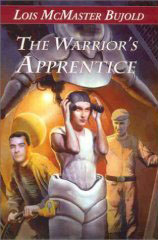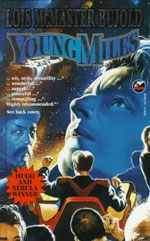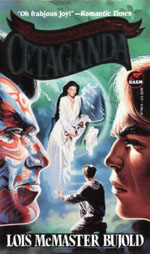 I made the mistake of re-reading Bujold’s Memory last week. I say “mistake” because reading Bujold is, above all, an addictive pleasure. I have thus been consuming her books at a rate of 1 or 2 per day ever since.
I made the mistake of re-reading Bujold’s Memory last week. I say “mistake” because reading Bujold is, above all, an addictive pleasure. I have thus been consuming her books at a rate of 1 or 2 per day ever since.
I’m reviewing The Warrior’s Apprentice and Cetaganda together here because, in many ways, they are very similar works. They are also, perhaps, the books I see most consistently cited as the “worst” or “weakest” examples of the Vorkosigan series. This is not a reputation they deserve. Even The Warrior’s Apprentice — which may, in fact, rank last on the list of stories starring Miles — is ill-served by a description of “weak”. It is, rather, a good novel which has the relative misfortune of being written by a woman who has gone on to write great novels.
THE WARRIOR’S APPRENTICE
This is only the second time I’ve read The Warrior’s Apprentice. It was the second Bujold book I ever read, taking up the second half of the Test of Honor omnibus (which also collected Bujold’s first novel, Shards of Honor).
In my memory, The Warrior’s Apprentice didn’t particularly distinguish itself. I was left with the vague impression of a light adventure story, without the depth of character or theme which I came to recognize in Bujold’s later work. An addictive reading experience, yes, but not a lasting one.
My memory has been playing tricks on me.
Sure, at first glance this is nothing more than a light adventure story: Boy seeks adventure among the stars. And, to be sure, Bujold embraces the plot with fast-paced prose and character, carrying you along with stylish verve on a thrilling rollercoaster ride.
But, as the novel progresses, you begin to gain the sense that there’s more at work here: Why, for example, does Bujold choose to touch so lightly on some of the adventure elements in her plot? Why do none of the characters develop the way you would expect them to in an adventure story?
Because Bujold isn’t telling a light adventure story. She’s telling a coming of age story, and the light adventure is just a trapping. What’s really clever is that it isn’t just a random trapping selected to spice things up: It’s a light adventure trapping because that’s what Miles goes looking for. (What Miles finds, of course, is something quite different.) Throughout the novel there is a running joke about the difference between the way things work in holovids and the way things work in reality. It’s charmingly witty throughout and has a wickedly amusing pay-off towards the end, but I also see it as a commentary on the novel at a much deeper level: There’s a way things work in a light adventure story, and its quite different from the way things work (and why they work) in this story.
And, like so many of Bujold’s works, the story of Miles is only the beginning of what the novel has to offer: Take a look at how his coming of age is eloquently mirrored in Elena’s. (And it is mirrored, not duplicated, you’ll note.) And once I realized that it was also a story of redemption, whole new layers of the narrative opened up for me.
Which isn’t to say that The Warrior’s Apprentice doesn’t have its problems. The construction of the plot is not as smoothly or as brilliantly handled as a later Bujold might have done. There are notable occasions of authorial fiat and startling coincidence (although they’re generally well-covered). The ending, in particular, is very weak: Its pacing is rushed and the earlier scenes which established its basis were clumsily included.
 So I’m left looking back on my memory and trying to figure out why it betrayed me: Sleep deprivation might have something to do with it. After finishing Shards of Honor around 3 A.M. or so I just kept reading straight through The Warrior’s Apprentice, which probably degraded the reading experience (no matter how much Bujold demanded my continued attention). I think I can also blame it, in part, on the fact that – after Shards of Honor – I was expecting a sequel starring Cordelia, not one starring her son twenty years later. And the weak ending probably didn’t help to give the book a strong, lasting impression, either.
So I’m left looking back on my memory and trying to figure out why it betrayed me: Sleep deprivation might have something to do with it. After finishing Shards of Honor around 3 A.M. or so I just kept reading straight through The Warrior’s Apprentice, which probably degraded the reading experience (no matter how much Bujold demanded my continued attention). I think I can also blame it, in part, on the fact that – after Shards of Honor – I was expecting a sequel starring Cordelia, not one starring her son twenty years later. And the weak ending probably didn’t help to give the book a strong, lasting impression, either.
Or maybe, with more Bujold experience, I just know what to look for now. Books like Memory made it plain that Bujold offered hidden depths, and so now – coming back to The Warrior’s Apprentice – I am more apt to see that which was there all along, instead of reading it “merely” as a light adventure and overlooking the nuances of its true quality.
I also think a greater exposure to the stories of the Vorkosigan cycle as a whole help to soften the sharp edges of the novel’s flaws. For example, the redemption of the future Dendarii has a deeper resonance when you recognize their future selves. The ending, too, works better now that I have a prior understanding of, for example, the relationship between Miles and Gregor, whereas – when I first read the novel – the revelation of their prior relationship was dumped on me only at the very moment that it was required.
Another thing: I’m struck, once again, by the fact that Bujold’s books function so differently depending on the order in which you read them. There’s a lot of material in The Warrior’s Apprentice, for example, which alludes to events in Shards of Honor. When I first read it, I was intimately familiar with those events (having just finished Shards of Honor) – and the book read one way as a result of that. Coming back to The Warrior’s Apprentice, its been several years since I read Shards of Honor and The Warrior’s Apprentice reads very differently as a result.
And it works both ways. It even works (in yet a third way) if you’ve read Barrayar before reading The Warrior’s Apprentice, even though Barrayar had not yet been finished or published when The Warrior’s Apprentice first appeared. That’s an astonishing accomplishment. And is a depth which, undoubtedly, makes re-reading Bujold such a uniquely enjoyable and enriching experience.
CETAGANDA
 Cetaganda suffered a horrible fate: It was a published after Mirror Dance and before Memory.
Cetaganda suffered a horrible fate: It was a published after Mirror Dance and before Memory.
If you’ve never read the books, you’ll have no idea why that’s important. Suffice it to say, however, that Mirror Dance and Memory are one type of book… and Cetaganda is a very different kind of book. As a result of its place in publication order, however, Cetaganda is repeatedly contrasted against its two closest siblings: The result is like comparing an apple to oranges, and Cetaganda seems to lose out every time.
Like The Warrior’s Apprentice, Cetaganda is a light adventure story. Where The Warrior’s Apprentice tends towards space opera, however, Cetaganda tends towards mystery and political intrigue.
I could wax eloquent about all the amazing things that Bujold does in this book, but most of it would be merely repetitious (since it’s the same amazing things she does in all of her books). Instead, let me point out three specific things and let it rest at that.
First, the plot is a fast-paced tale of mystery and romance. Of course, Bujold being Bujold, neither plot has the good manners to play by all the rules. Have you heard the anecdote about the author who, when all else fails, would have someone come through the door with a gun? That happens on page two. (Well, not quite. Bujold doesn’t play by the rules remember.) That gets the plot running. By page twenty-five, the plot has hit Mach 2 and you’re basically stuck on the ride until it comes to an end.
This means that, above all, Cetaganda is a fun book to read.
Second, the world-building is literally breathtaking in its beauty and startling in its depth. Cetaganda is a world on the cusp of the transhuman, and Bujold conjures forth a grand image: Here, the social intricacies of a byzantine imperialism. There, the wondrous spectacles of a world where nature, technology, and art are one and the same. And then, just as you are being seduced by Cetaganda’s charms, Bujold reminds you that there is no such thing as perfection: Here, the corruption and degeneracy of caste. There, the subtle horrors which can only be created by those with a godlike power over life itself.
Third, the character arc of Miles. When read in publication order, this arc suffers from the fact that the Miles of Mirror Dance (the previous volume) has already moved beyond the personal issues he must grow through here. When read in internal chronological order, on the other hand, the arc suffers because Miles is beginning to consider issues which are not fully explored until Memory and Komarr. But if you can approach Cetaganda as a novel unto itself, I think you’ll find a lot of entertainment in watching Miles grow as a character.
In short, I find Cetaganda to be a book both fascinating and entertaining. It has withstood the test of being re-read twice, and I have no doubt that it will stand that test again.
GRADES:
WARRIOR’S APPRENTICE: A-
CETAGANDA: A
Lois McMaster Bujold
Published: 1986 / 1996
Publisher: Baen Books
Cover Price: $7.99
ISBNs: 1-886-77827-2 / 0-671-87744-5 / 0-671-87782-8 (omnibus)
Buy Now!











